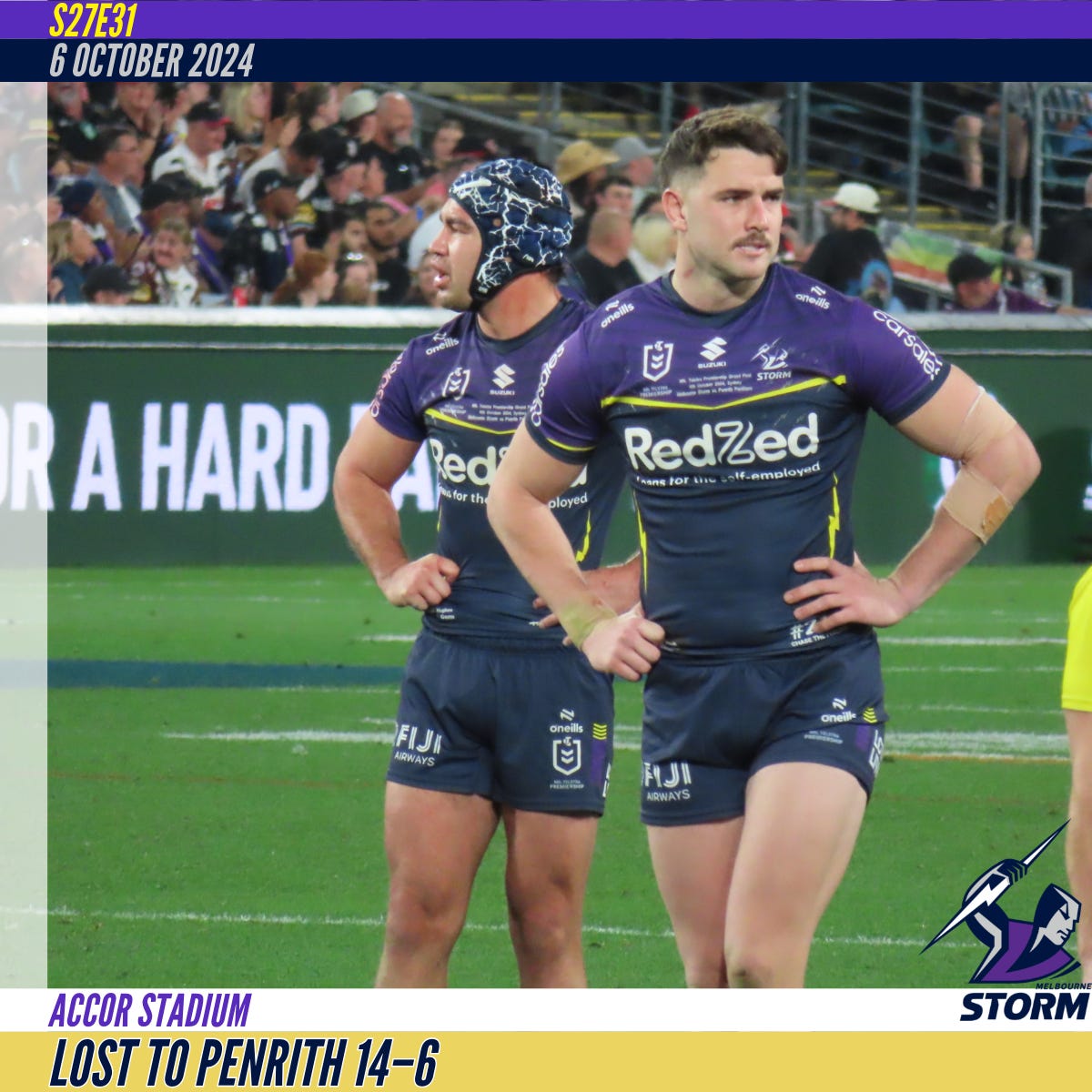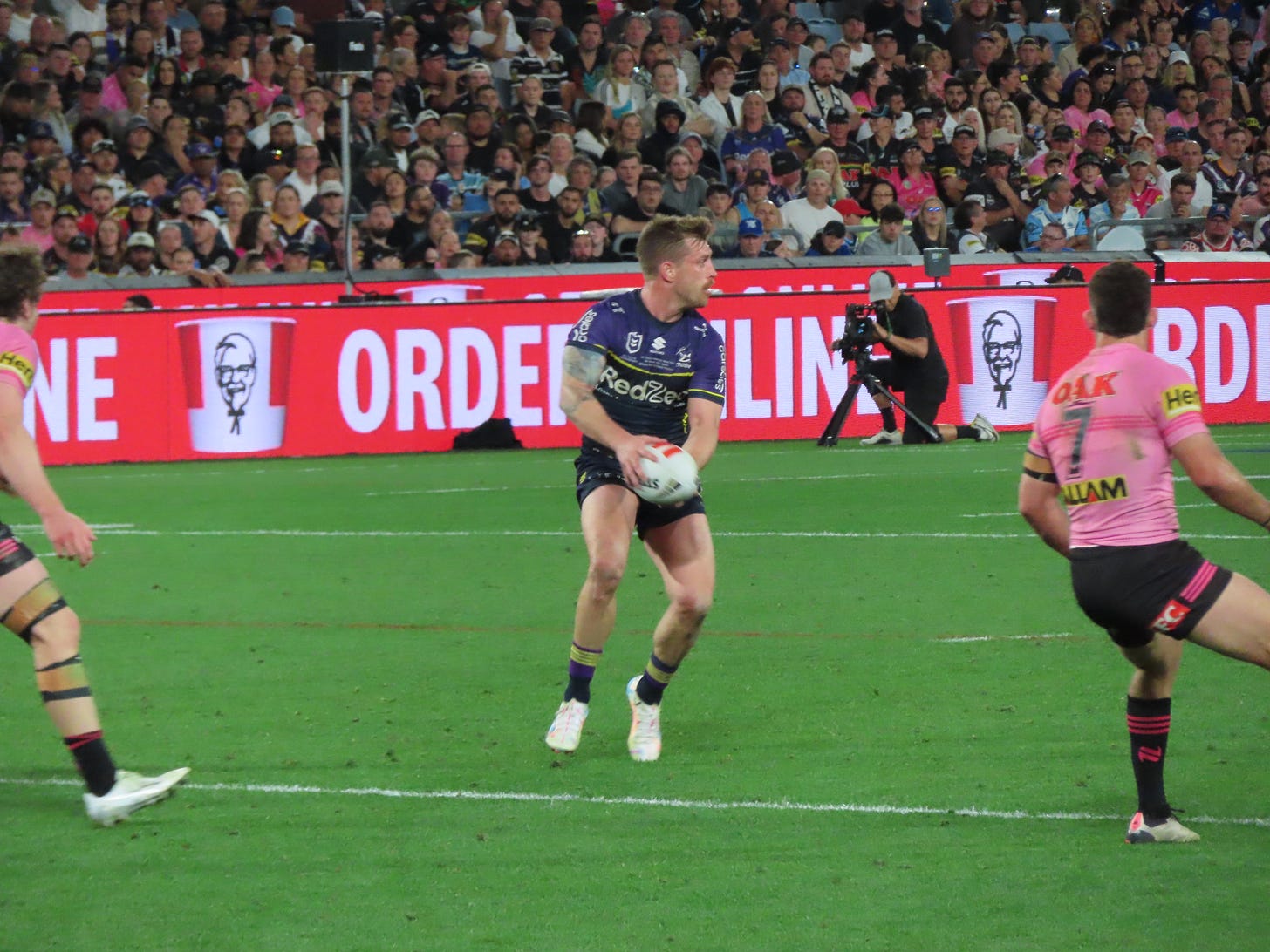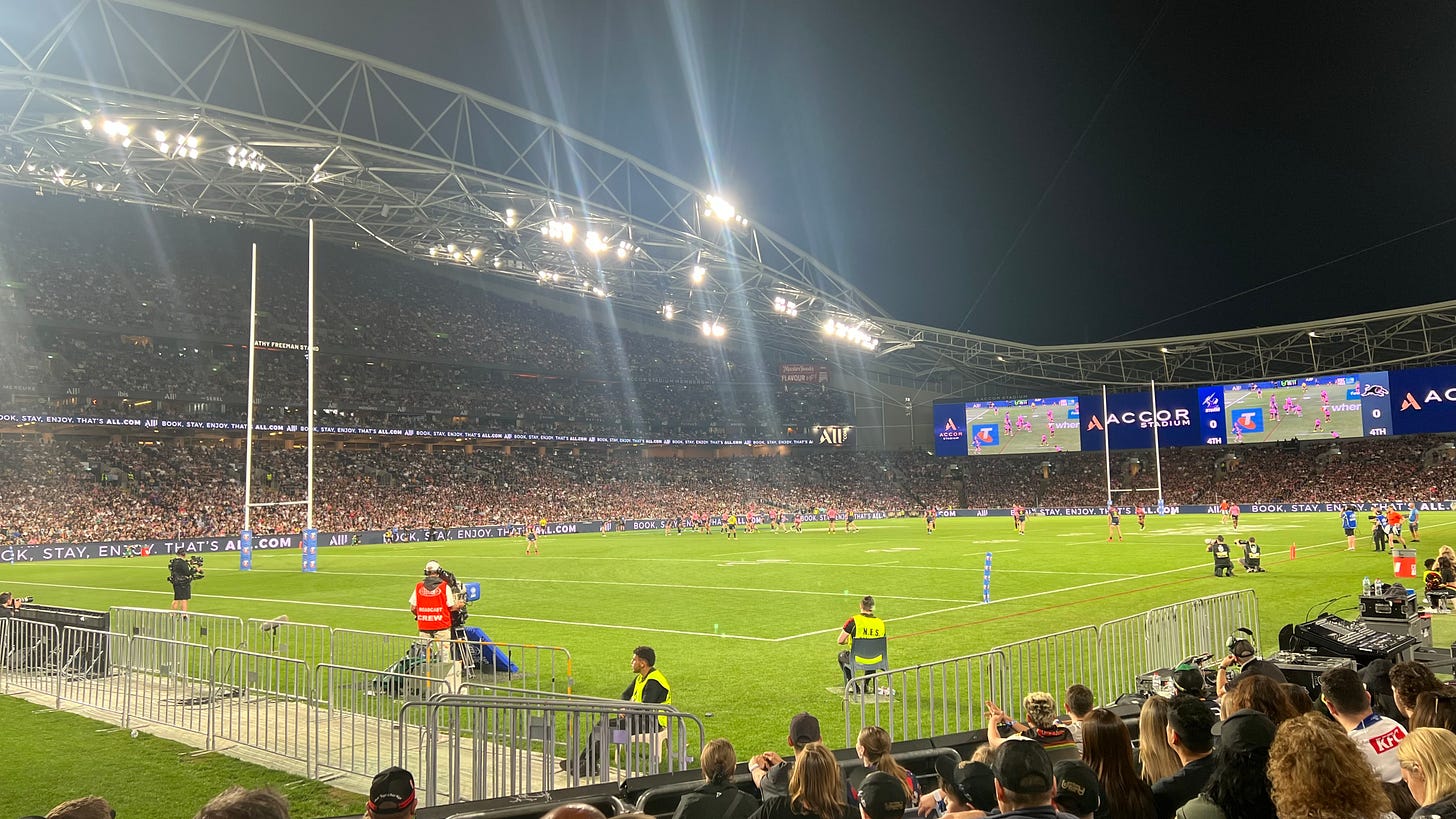It just wasn’t meant to be for Melbourne.
Melbourne – 6 (Grant 23' try, Meaney 1/1 goal)
Penrith – 14 (Turuva 27', Martin 39', Alamoti 61' tries, Cleary 1/3 goals)
What highlights there were have been stretched into this 13 minute1 video:
What went wrong
There’s always lessons to learn from defeat. Rather than poring over the game with a fine-toothed comb, or resorting to being weird, I thought it best to pick out a few themes.
Middle forwards and bench rotation
Without Nelson Asofa-Solomona, much was needed from Melbourne’s middle forwards and those coming from the interchange. In the preview I wondered whether Melbourne should start with Christian Welch so as not to disrupt the role Tui Kamikamica has been playing through the middle of matches. Instead Kamikamica started, made the first hit up from the kick off, touched the ball just once more, made 20 tackles and was interchanged in the 18th minute for Alec MacDonald and wasn’t seen again. Was he injured? He was certainly gassed as early as the 13th minute.
Kamikamica’s absence had a knock-on effect to the rest of the middle forwards. Harry Grant had to make too many tackles. There was not nearly enough big body hard tackling of Cleary, Luai and Edwards. Josh King wasn’t able to get a roll on forward with the ball in any meaningful way.
In place of Kamikamica, MacDonald played 36 minutes, then came back for the final eight minutes replacing Lazarus Vaalepu. His six carries were okay after his first touch dropped ball, his 38 tackles emblematic of the work that he had to carry for others.
Christian Welch was able to do a couple of nice things when he got his chance around 30 minutes into the match, but in the end his stint of 20 minutes either side of half time wasn’t enough from an experienced player. It will be interesting to see what happens next for the big unit. I hope he stays at the Storm and works hard to define his role in 2025 and beyond.
After Josh King came back in the second half, you could see how Melbourne wanted to create in the middle of the field. Tyran Wishart was dangerous and able to find little gaps, but the Penrith forwards weren’t as fatigued as Melbourne had been due to their possession and field position. It left the to Storm hammer away against a defensive unit who just loves to break teams.
Surprisingly it was Wishart who went off for Lazarus Vaalepu to enter the fray. Like Kamikamica, big Laz didn’t get to do much. Just two carries and a few tackles. I maintain that Joe Chan could have filled this role and been a useful weapon through the middle of the match, especially if he was given the task of disrupting the Panthers playmakers whenever they decided to run the ball.
But in the end it was Melbourne’s outside and edge players who had to do too much of the grunt work in the middle of the field. That left them vulnerable when needing to back up that effort in defence, and often unable to compete in attack when there might have been a chance out wide.
Not stopping the offloads
Penrith had 20 for the match. Melbourne 10.
That’s a bunch more extra work that didn’t need to happen for the Storm.
Kicking game
Jahrome Hughes was just a fraction or so off his astronomical high form of 2024. Those fractions were obvious in where his kicks were landing. Penrith’s outside backs were all too happy for Melbourne to catch the ball knowing that they could tackle them immediately. Too often attacking kicks were landing closer to the 10m line than the goal line. Yes the risk of a seven-tackle set is higher, but the daring was lacking. It was a conservative approach that didn’t pay off.
When Hughes did try and take an attacking option in the second half following the linebreak by Coates down the left, his kick harmlessly found touch down the right wing on tackle four. It was a missed opportunity to apply pressure with a better kick.
Melbourne were forced to move the ball left
Penrith knew where the Storm needed to be suffocated and heavily impacted Melbourne’s ability to move the ball to the right edge. This blunted the impact that Hughes and Katoa were able to have on the game, leaving Munster and Blore to do a lot of the running plays late in tackle counts. That gave Penrith the matchup that they wanted — Liam Martin slowing down Munster.
It wasn’t all bad news though. Blore was able to set up the play for the Grant try midway through the first half, his run at Cleary resulting in a fast play-the-ball for Grant to do his thing.
Penrith attacked Melbourne’s strengths
All week in the lead-up we heard about Melbourne’s height advantage out wide. Cleary and Luai heard that and put Melbourne’s wingers to the test under the high ball in defence. Will Warbrick spilled one straight after Harry Grant’s try, his timing way out.
From the resulting field position, the Panthers went straight back at Melbourne’s right edge, their attack able to move Katoa in and out of position, forcing Hughes, Meaney and Warbrick to be exposed for Sunia Turuva to score2 in the corner.
Jack Howarth
In his first full NRL season, Howarth has come along nicely. Forcing his way into the centre role and displacing Reimis Smith is a credit to how far he has come along. In the pressure of a Grand Final appearance, he had a night that can only spur him on to want to improve further in 2025. His error in the 11th minute meekly transferred possession in attacking position.
His positioning on the Panthers try just before half time will also be a lesson in reading the play. Penrith’s change of direction would have caused most teams issues, but under fatigue Melbourne were shot in the middle and the system broke far too easily.
Come the second half, Liam Martin was able to strip the ball far too easily from the centre, putting the Storm on the back foot again. Then the moment of the match. From where Howarth collected the ball from Xavier Coates he had to score. He needed to get lower and put the ball at worst on the line. Never give the officials a chance to screw you over. Whether or not you believe it was a try and that some blade of grass touched the ball3 is almost immaterial. The attacking player needs to make sure there is no doubt. Yes the four Panthers players who came into stop Howarth deserve all the credit, but this one moment needs to be the catalyst for the rookie centre to improve his game enough, so that this doesn’t happen to him again in a big game. Always be improving.
Klein and Atkins
As soon as Ivan Cleary put the officiating on notice last weekend, you knew something was cooking. Klein is always going to be the way he is. There is no escaping his peculiar decisions. His first decision of the night in the fourth minute to afford the Panthers a six again on the last tackle was generous at best to the pink team. That generosity extended to the difference in apparent play-the-ball speed. In watching the replay, it was interesting to me how often Penrith players would put extra weight and pressure onto the middle of Melbourne players backs just a little bit longer than necessary.
The penalty afforded to James Fisher-Harris in the 12th minute against Josh King wasn’t picked up on the Nine coverage, but it was a good example of the double standards in officiating. The lack of consistency is a trademark of Ashley Klein. There were multiple moments across the game where a six again could have been called against Penrith for their regular infractions, but going in to the match we knew these wouldn’t be called.
Atkins first involvement was Penrith’s challenge against their ball strip on Ryan Papenhuyzen. His call of inconclusive was curious at best. There was no decision required from Atkins on Papenhuyzen’s errant kick from the restart. He would get the decision right on the Katoa tackle on Turuva to stop a try, although why Klein called him to make that decision was concerning.
Having retained their challenge, Penrith were able to overturn a Klein mistake early in the second half, but Atkins got trigger shy a few minutes later when Hughes was decked by Mitch Kenny after he kicked long. An interesting interpretation to make.
As mentioned in the section above, the officials should never have had to guess/interpret the no try decision that went against Melbourne. The touch judge was poorly positioned for a start, as was Ashley Klein who seemingly was disinterested in properly checking himself before sending it to the Bunker as a no try. On the available video evidence Atkins had the decision to make and he made it.
There is no grand conspiracy here against Melbourne. Atkins is a life member of the Penrith Referees Association where he came through the junior ranks as a referee. So what! Ashley Klein’s dad John played 30 first grade matches for the Panthers in the 1970s. That’s almost 50 years ago. Who cares really. Storm fans (and others) making these points are embarrassing yourselves if you’re taking these facts as some kind of NSW conspiracy.
We can discuss this moment forever, but in the end Craig Bellamy’s words are enough:
It is what it is. It went up to the bunker, came down no try. At the end of the day it doesn’t matter what I think. With all due respect, whether it was the right decision or wrong decision, I don’t know.
At the end of the day, that’s not in my control. We’re always preaching that our way is to control what we can control. That’s not in our control.
Melbourne had 30 minutes to score after the no try. Action or inaction by the officials didn’t stop Melbourne. It was the opposition. I’m also fascinated by those who called for Adam Gee to be the appointed referee for the Grand Final. Klein was always the best of the worst choices.
The final decision that Atkins made in the Bunker ruling that Coates touched the ball was wrong, but meh, Melbourne were beaten.
The less said about The Boy Who Cried Wolf and earned his team a break with five to go, the better. Same goes for the idiotic decision by Klein to penalise and report MacDonald for touching Cleary. Thankfully both reports were not acted upon by General Bias.
Shockingly, Penrith are really good
All season there’s been a theme of attitude and effort. Penrith have that in spades. Melbourne were about 99% of the way there. Perfection is bloody hard to achieve. Penrith are a disciplined team that gives nothing away. Everything is hard earned against them.
Even after Brian To’o went off injured, Melbourne were locked out of capitalising on what could have been a favourable matchup on that side of the field, with the Panthers stepping up again to suffocate Melbourne’s playmakers.
The effort of Liam Martin to compete or the high ball against Coates summed up the night. Penrith just did the little things slightly better, made just that little bit more effort. Melbourne just missed it by the proverbial that much.
The exclamation point came in the 71st minute when three Penrith defenders monstered Jack Howarth into touch. Relentless defence.
The stat that alarmed me though was Melbourne’s missed and ineffective tackles. 80 versus 49 on the NRL.com stats. That’s not sustainable.
Yes Penrith have been fortunate over the last five seasons with a number of things that have happened across their reign, but sometimes being great lets you create your own luck.
NRL Grand Final Power rankings
This match won’t rank highly. My initial ranking straight after the match slotted it in at 19th, just below the 2021 decider. It sits in the bracket of defensive battles, but without a true signature moment, this one won’t live long in the memory.
Stat offloads
The announced attendance of 80,156 was the lowest for a NRL Grand Final since 2017 (excluding the pandemic affected years).
In 11 NRL Grand Final matches, Melbourne have been held scoreless for seven halves (four first and three second halves).
Was it worth it?
Losing grand finals is never a good time. That’s now five for the Storm, but to be honest this one ranks lower on the list than others.4
As I expressed in my final thoughts, I went into the match expecting to lose, but hoping to win. By about 7pm, that hope had diminished for me. The vibes weren’t there. Harry Grant’s try was a ray of light, but it was purely the headlight of the train of inevitability that Penrith were coming.
As expected though, the match was Penrith’s to lose and they just refuse to do so. The suffocation of Melbourne’s attacking weapons, only broken by a piece of Harry Grant’s magic, the singular line break of Xavier Coates, and his catch to set up the Jack Howarth no try, proved yet again that defence is the key to victory.
Melbourne were able to match them in defence for the most part, but the try just before half time was a killer blow. That lapse under fatigue felt inevitable a minute or so before it even happened.
The player’s mantra this year was “Chase the feeling” — it may be that this playing group needed to experience this feeling first.5 It sucks, but this group with the addition of Stefano Utoikamanu just needs to find that little bit extra to try again in 2025. Because this feeling burns and festers — it can only be healed by tasting the ultimate success.
The quest for seven starts again.
2/10
Storm Machine Player of the Year
Capped off with a try, there wasn’t much more Harry Grant could have done to lead Melbourne. His stats are Smith-like as a result. In a beaten forward pack, Trent Loiero stood tall again in his time on the field. Eli Katoa’s try saving tackle on Turuva was a massive play, and he was almost Melbourne’s spark in the second half in attack, but just needed more ball. He was able to crunch a few Panthers in defence too which helped the cause..
Thought Tyran Wishart and Alec MacDonald (even with him dropping the ball with his first touch) were good off the bench, in what was a lopsided bench rotation. Cameron Munster tried so very hard to be everywhere for Melbourne, but in doing so was caught out on the Martin try. On another night Xavier Coates would have been a gamebreaker for the Storm, the winger got through a power of work trying to drag Melbourne forward down the left flank.
For me, with six points from Melbourne’s three finals matches, Harry Grant was Melbourne’s player of the finals. His leadership has improved across the season and there’s not much more he could have done to take this group to a premiership. His reward has seen him elevated to vice captain of the Kangaroos for the upcoming Pacific Championships.
Grand Final points:
2 – Harry Grant
2 – Eliesa Katoa
1 – Trent Loiero
Final standings:
35 – Jahrome Hughes
22 – Harry Grant
18 – Eliesa Katoa
12 – Tyran Wishart
10 – Cameron Munster
9 – Ryan Papenhuyzen, Trent Loiero
8 – Xavier Coates, Josh King
7 – Will Warbrick
6 – Grant Anderson, Jack Howarth, Christian Welch
5 – Nelson Asofa-Solomona
4 – Shawn Blore, Tui Kamikamica, Sualauvi Fa’alogo
3 – Nick Meaney, Joe Chan
2 – Alec MacDonald
1 – Jonah Pezet, Reimis Smith, Bronson Garlick, Lazarus Vaalepu
To come in 2024
Will let some dust settle to compile the player reports, and end of season review posts.
The Storm Awards night was on Tuesday 8 October, with most of the awards going as expected:
Cooper Cronk Feeder Club Player of the Year: Lazarus Vaalepu
Best Try Award: Xavier Coates
Most Improved Player Award: Trent Loiero
Billy Slater Rookie of the Year Award: Jack Howarth
Members Player of the Year Award: Jahrome Hughes
Best Forward of the Year Award: Harry Grant
Best Back of the Year Award: Will Warbrick
Cameron Smith Player of the Year Award: Jahrome Hughes
The actual fuck.
Yes he got the ball down, don’t be weird people.
On the balance of probabilities, it’s likely it might have.
2006, 2016, 2018, 2024, 2008 — if I were to rank them on the pain scale.
Or be slightly more specific on which feeling.











For some reason reading your summary has made me feel better …hopefully this loss isn’t the last we see this team in a grand final